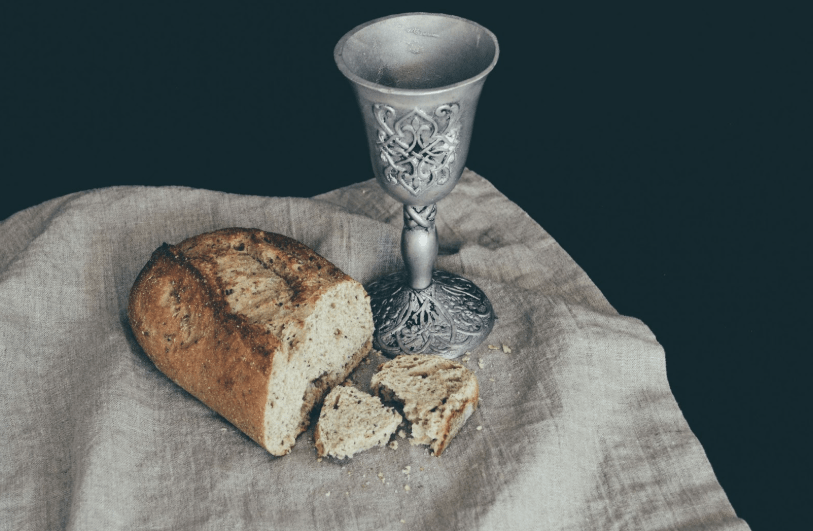Helping Your Child Understand Communion: A Parent’s Guide to a Meaningful Celebration

Communion is one of the most meaningful times in a believer’s life. It’s a moment to remember Jesus’ sacrifice and to celebrate the grace that unites us as His family. For parents, it’s also a wonderful opportunity to teach children why Communion matters and how to take part in it with faith and understanding. This guide will help you explain the meaning of Communion, prepare your child’s heart, and make this time of worship special for your family. Why Communion Matters for Families Communion reminds us of Jesus’ love and the promise of salvation. When children understand that the bread and cup symbolize His body and blood, they begin to see Communion not as a ritual, but as a personal act of gratitude and faith. Here’s what you can share with your child: The bread reminds us of Jesus’ body, given for us. The cup reminds us of His blood, poured out for forgiveness. We take Communion to remember, give thanks, and renew our faith. Encourage your child to see Communion as a time of reflection — a moment to think about what Jesus has done and how much He loves them. When Is a Child Ready for Communion? Each church handles Communion differently, but the key is spiritual readiness. Children should understand who Jesus is and what it means to follow Him before participating. Parents can talk with their pastor or children’s ministry leader about how their church welcomes kids to the Lord’s Table. A child may be ready when they: Have accepted Jesus as Lord and Savior. Can explain, in their own words, why Jesus died for us. Show reverence during prayer or worship. If your church uses Kingdom Prefilled Communion Cups, this can also make the experience simple and reverent for families and kids’ ministry groups, giving each child their own moment to participate safely and respectfully. Teaching Reverence and Respect Helping children understand the seriousness of Communion begins at home. You can prepare their hearts by showing them what it means to approach the Lord’s Table with humility and thankfulness. Ways to teach reverence: Pray together before Communion. Read 1 Corinthians 11:23–26 as a family. Explain that we take Communion to honor Jesus and to remember His gift of salvation. Encourage quiet reflection, gratitude, and prayer during the service. Children learn best by example, so let them see you take Communion thoughtfully and with joy. Talking About Communion at Home Creating conversations about faith at home helps children connect what they see in church to their own lives. Simple ways to start: Ask, “Why do you think Jesus wants us to remember Him with bread and juice?” Read the story of the Last Supper in Luke 22:14–20. Share a personal story about what Communion means to you. You can even have a short family devotion before Communion Sunday to help your kids prepare their hearts. Making Communion Special for Your Family Communion doesn’t have to be limited to Sunday services. Some families also take Communion together during holidays, prayer nights, or home Bible studies. It’s a beautiful way to bring your family closer to God. Ideas to make it meaningful: Play worship music and read a short Scripture. Use prefilled cups from AllCommunion.com for easy setup. End with a family prayer of thanks. The goal isn’t to make Communion fancy, it’s to keep it heartfelt. Ready to create your own family Communion moment? Browse our Communion Sets and Prefilled Cups to make preparation easy and meaningful for everyone. Common Mistakes to Avoid Treating Communion as just another tradition rather than a personal moment of faith. Pressuring children before they understand its meaning. Forgetting to explain the “why” behind the practice. Frequently Asked Questions (FAQs) Q1. What does Communion symbolize? It represents Jesus’ body and blood — a reminder of His sacrifice for our forgiveness and salvation. Q2. How do I know my child is ready? If your child understands who Jesus is and has chosen to follow Him, they are likely ready to participate. Q3. Can kids take Communion at every church? It depends on each church’s practice. Ask your pastor or children’s ministry leader for guidance. Q4. How can I make Communion meaningful at home? Pray, discuss, and find what fits your worship style and resources. The goal is to serve with joy and reverence.
The Importance of Reverence and Preparation Before Communion

Communion is one of the most important sacraments of the Christian faith. Through the practice of communion, we contemplate the sacrifice of Christ on the cross. We express gratitude that His body and blood was given for us to be free from sin. This sacrifice is the reason we must bear reverence before communion. It is also why we should prepare accordingly for this holy moment. Communion readiness ensures we approach the Lord’s Supper with the respect it deserves, fostering an honest, meaningful connection with God. This guide explores the importance of a reverent approach to communion, offering practical steps to prepare for communion that honor its sacredness. Why is Communion Important? Communion is a sacred observance that encapsulates the essence of the Gospel. It is significant because it is a reminder of Christ’s death on the cross to redeem us. Through communion, we are encouraged to consider the pain that Jesus endured and the ultimate price that He paid for the salvation of humanity. The bread represents His body and the wine, His blood. When partaking of the elements, we declare His sacrifice and His unending forgiveness and love. Communion emphasises that salvation is a gift from God. Believers who participate in the sacrament confess their reliance on God’s grace for their spiritual deliverance. This observance, instituted by Christ Himself, allows Christians to strengthen their commitment to uphold Christian values daily, reaffirm their faith, and thank God for the blessing of salvation. Understanding the Importance of Reverence Before Communion Reverence before communion is all about understanding and properly appreciating the profound meaning of the Lord’s Supper. It is a time to remember His sacrifice, His forgiveness and unending love. It is a time to examine oneself and confess sin. For Christians, this reverent approach to communion involves approaching the table with humility and gratitude, as the elements symbolize Christ’s body and blood. If we lack reverence in communion, we are missing the point of the sacrament entirely. Why Communion Readiness Sets the Tone for Worship Communion readiness is about preparing us and ensuring the congregation has properly examined themselves before partaking. This spiritual preparation for communion puts the focus on God so that the tone of worship goes far beyond the sacrament. With communion reflection and prayer, we can prepare for the communion table by deepening our connection with Christ. Steps to Prepare for Communion with Reverence Preparing for communion involves a number of intentional steps to ensure communion readiness. Below are a number of steps that can act as a communion preparation guide so that you can approach the Lord’s Supper with the respect it deserves. It is important to seek forgiveness before you attend communion. Engage in communion self-examination and reflect on your relationship with God. Confess your sins to Him and ask for forgiveness so that you can approach the table with a clean heart. You also need to take some time for prayer, where you can meditate on Christ’s sacrifice and its great significance in your life. This spiritual reflection before communion will prepare your heart for the sacrament. Read passages like John 6:43-58 or Luke 22:19-20, which will help in understanding communion significance, grounding your preparation in God’s Word. Teaching Children Communion Reverence Children are also an important part of the congregation and should be included in communion. Preparing for communion with children involves helping them to understand Christ’s sacrifice and the meaning of the sacrament in simple terms. This first communion preparation helps young ones develop a lifelong reverence in communion. Enhancing Your Communion Experience with the Right Tools The tools you use are vital to the success of communion. For proper reverence before communion, you need to get the right tools that will support communion readiness. Kingdom offers a variety of tools that will help you prepare for communion: Kingdom Prefilled Communion Cups and Wafers – Box of 500 – Red Grape Juice Kingdom’s prefilled communion cups are hermetically sealed to maintain freshness and sanitary distribution of the elements. Made from 100% real Premium Grape Juice. No artificial flavors! No artificial colors! Absolutely no added sugar! And the only water is filtered water. Communion Set Serves 160 – Brasstone The full communion set serves up to 160 people. Fellowship Cup Prefilled Communion Cups, Box of 500 Experience the seamless communion experience with our Fellowship Cup Prefilled Communion Cups. This box of 500 cups offers sanitary convenience, featuring prefilled communion elements, providing ease of use for congregations. Crafted with precision, each cup contains a fresh wafer and 100% grape juice. Elevate your worship gatherings with this time-saving solution, ensuring a sacred and meaningful communion observance. Addressing Common Questions About Preparing for Communion Why Is Reverence Before Communion Important? Reverence before communion honors Christ’s sacrifice, fostering a deeper connection with God and making important spiritual preparation for communion, as noted in biblical teachings like 1 Corinthians 11:23-29. How Can I Prepare for Communion Spiritually? Prepare for communion by engaging in self-examination and repentance, prayer, and Scripture reading, as outlined here, to approach the sacrament with a focused heart. How Do I Teach Children About Communion? Teach children reverence for communion by explaining its meaning and guiding them in preparing spiritually for communion, helping them develop a lifelong respect for the sacrament. Embrace Reverence Before Communion for a Deeper Experience Reverence before communion and proper communion readiness transforms the Lord’s Supper into a deeply spiritual experience. By taking time to prepare for communion, you honor its sacredness, fostering a stronger connection with God and your church community. Whether through preparing for communion with prayer or using the right tools, this preparing for communion ensures the sacrament is a moment of true worship. Ready to deepen your communion experience? Start practicing reverence before communion today and elevate your worship.
Sanitise Communion Cups Safely: A Comprehensive Guide

Ensuring the cleanliness of reusable communion cups is paramount for maintaining the health and safety of congregants during the observance of the sacrament. Proper cleaning not only preserves this sacred service, but also prevents the spread of illnesses. This guide provides detailed steps and considerations for effectively sanitising church chalices and other communion ware. Understanding the Importance of Clean Communion Ware Communion is a sacred act of worship, and the cleanliness of the ware used plays a crucial role in upholding its sanctity. Regular and thorough cleaning of communion ware ensures that participants can partake in the sacrament without health concerns. Best Practices to Sanitise Communion Cups 1. Immediate Rinsing Post-Service After each service, promptly rinse the communion cups with warm water to remove any residual wine or juice. This prevents staining and makes the subsequent cleaning process more effective. 2. Use of Mild, Non-Abrasive Cleaners Opt for gentle dish soaps that are free from harsh chemicals. These cleaners effectively remove residues without damaging the cups. 3. Avoiding Harsh Chemicals Certain chemicals can be detrimental to both the communion cups and the health of congregants. For instance, bleach is a strong oxidising agent that can corrode metals and degrade certain plastics, making it unsuitable for cleaning delicate items like communion cups. Instead, opt for mild, non-abrasive cleaners specifically designed for religious or food-grade items to ensure both cleanliness and preservation of the cups. Additionally, phosphoric acid, commonly found in rust removers and toilet bowl cleaners, should be avoided. This chemical can cause skin irritations, respiratory problems, and even chemical burns. Ingestion of phosphoric acid can lead to stomach pain, nausea, and vomiting. Its corrosive nature makes it unsuitable for cleaning communion cups, as it can damage the surface and compromise the integrity of the materials. Another chemical to avoid is formaldehyde, a preservative used in various cleaning products. Formaldehyde is a known carcinogen and can cause respiratory irritation and skin allergies. Prolonged exposure to formaldehyde has been linked to an increased risk of cancer. Using cleaning products containing formaldehyde on communion cups can pose health risks to those handling them and should be avoided. 4. Proper Drying Techniques After washing, allow the communion cups to air dry on a clean, lint-free cloth. Avoid using towels that may leave fibres on the cups. 5. Regular Inspection Periodically inspect your communion ware for any signs of wear, tarnish, or damage. Addressing these issues promptly ensures the longevity and safety of these items. Additional Tips for Church Sanitizing Practices Dedicated Cleaning Supplies: Use separate sponges and cloths exclusively for cleaning communion ware to prevent cross-contamination. Storage: Store the cleaned communion cups in a clean, dry place to prevent dust accumulation and potential contamination. Training: Individuals responsible for cleaning communion ware should be properly trained in church sanitation practices and understand the importance of using the appropriate cleaning agents. Maintaining the cleanliness of communion cups is a vital aspect of your church’s sanitary practices. By following the outlined tips above, and avoiding harmful chemicals, churches can ensure the safety and well-being of their congregants during every communion service.




